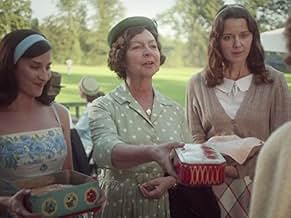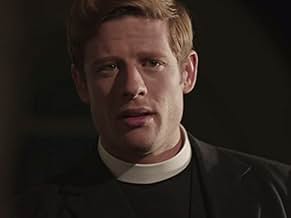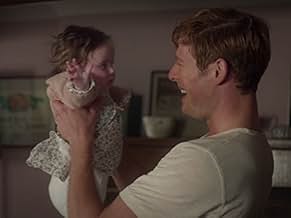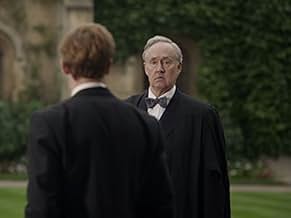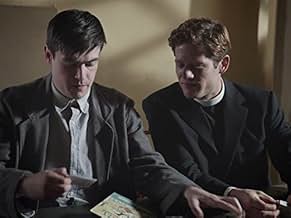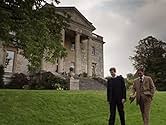A Cambridgeshire clergyman finds himself investigating a series of mysterious wrongdoings in his small village of Grantchester.A Cambridgeshire clergyman finds himself investigating a series of mysterious wrongdoings in his small village of Grantchester.A Cambridgeshire clergyman finds himself investigating a series of mysterious wrongdoings in his small village of Grantchester.
- Awards
- 3 nominations total
Browse episodes
Featured reviews
I have not read the books. Therefore I enter as a virgin into the land of Grantchester. So, to me, it is a pleasant, light, somewhat funny, charming show. If we accept the idea that the Director meant to make the show in that way, I think that it is successful. I think the acting is excellent, and the stories are within reason, and interesting,but not hard-hitting because the show is not meant to be "film noir". It is light entertainment. I don't have to really believe that a Vicar, Sidney Chambers (James Norton),is regularly solving murders with his friend, Geordie, the police detective. I need not believe that a seemingly small town would have so many murders--one or more weekly--OK, let's say the time frame is two months apart, still.....you get it. So I give this show a 9 because I do enjoy it. I particularly like the acting of James Norton as the Vicar, but all are good.
I have been an avid watcher of this programme for a number of years. I thought James Norton made a fabulous hunky, tortured vicar in the first incarnation of the series, but I was less pleased with Tom Brittney. We now have a third vicar, Rishi Nair, whom I think will infuse the role, and the show, with a bit more spice. I'm certainly hopeful!
What I like about the show: -It is light entertainment that always circles back to good values, after casting a light on questionable ones.
-British series use actors that look like real people. I like seeing wrinkles and a bit of chunkiness, balding men, a career woman with one arm, and homely looking folks.
-The locations are gorgeous.
-The acting is good, especially Al Weaver as Leonard. And Robson Green is the perfect actor for his role. I can't imagine anyone else in it, and am relieved they don't cycle through detectives like they do vicars.
Watching the series, of course, requires a generous helping of suspension of disbelief, as do most series in this genre (how many murders, really, can happen in a place this small, week after week?) and I can overlook some aspects that aren't quite in line with the times the series is set in, except the language. Somehow, I guess because the show is accurate with props and costuming, I expect the same of dialogue. But in this 9th season, Geordie is described as having "a thing for vicars", and his daughter calls everything "a drag". I don't think either of these idioms were all that popular in the early 60s, when (I believe) this is taking place. The new vicar also speaks of receiving envelopes through his mail slot containing "quotes" from the Bible, which any self-respecting vicar would refer to as passages or verses of scripture, certainly not quotes. These are irksome oversights, and I hope they employ somebody to watch out for these mistakes.
All that aside, I look forward to finding out what Alphy and gang get up to this season!
What I like about the show: -It is light entertainment that always circles back to good values, after casting a light on questionable ones.
-British series use actors that look like real people. I like seeing wrinkles and a bit of chunkiness, balding men, a career woman with one arm, and homely looking folks.
-The locations are gorgeous.
-The acting is good, especially Al Weaver as Leonard. And Robson Green is the perfect actor for his role. I can't imagine anyone else in it, and am relieved they don't cycle through detectives like they do vicars.
Watching the series, of course, requires a generous helping of suspension of disbelief, as do most series in this genre (how many murders, really, can happen in a place this small, week after week?) and I can overlook some aspects that aren't quite in line with the times the series is set in, except the language. Somehow, I guess because the show is accurate with props and costuming, I expect the same of dialogue. But in this 9th season, Geordie is described as having "a thing for vicars", and his daughter calls everything "a drag". I don't think either of these idioms were all that popular in the early 60s, when (I believe) this is taking place. The new vicar also speaks of receiving envelopes through his mail slot containing "quotes" from the Bible, which any self-respecting vicar would refer to as passages or verses of scripture, certainly not quotes. These are irksome oversights, and I hope they employ somebody to watch out for these mistakes.
All that aside, I look forward to finding out what Alphy and gang get up to this season!
Or that's how it appears. Do priests, Catholic or Anglican, seek refuge in the church as a shield from their own pain?
Sidney, a handsome ginger and Anglican priest, lives in the shadow of his past, so severely traumatized by a wartime incident that he seeks refuge not only in the church but from the bottom of a bottle and the burning embers of a cigarette. Neither option offers much.
In the end Sidney only wants to be loved and ventures outside the church with his friend Geordie, a detective, fighting crime and solving murders, which seemingly helps him find purpose.
The problem I have with these small-town detective stories is trying to figure out how so many murders can take place in such a single tiny geographical area.
A wonderful supporting cast from the love of his life, to the confused gay curate, the talented detective and the prudish zealot of a housekeeper.
In the states it's presented as a part of Masterpiece Theater. Check it out and you'll start to feel really good about yourself as a person.
Sidney, a handsome ginger and Anglican priest, lives in the shadow of his past, so severely traumatized by a wartime incident that he seeks refuge not only in the church but from the bottom of a bottle and the burning embers of a cigarette. Neither option offers much.
In the end Sidney only wants to be loved and ventures outside the church with his friend Geordie, a detective, fighting crime and solving murders, which seemingly helps him find purpose.
The problem I have with these small-town detective stories is trying to figure out how so many murders can take place in such a single tiny geographical area.
A wonderful supporting cast from the love of his life, to the confused gay curate, the talented detective and the prudish zealot of a housekeeper.
In the states it's presented as a part of Masterpiece Theater. Check it out and you'll start to feel really good about yourself as a person.
Maybe Patzak1974 is unaware that this series is based on stories by James Runcie, son of a former Archbishop of Canterbury who had himself served as a tank commander in WW2 before being ordained. Though James wasn't born until 1959, I think we can assume that he based the character of Sidney on conversations he had had with his father about his wartime experiences and how they affected his faith.
Personally, I find the character much more believable than many portrayals of clergy I've seen in TV dramas. At least he is correctly addressed as "Mr Chambers", since the American habit of addressing priests as "Reverend" had not then reached these shores!
Personally, I find the character much more believable than many portrayals of clergy I've seen in TV dramas. At least he is correctly addressed as "Mr Chambers", since the American habit of addressing priests as "Reverend" had not then reached these shores!
I like Grantchester for the period costumes and the Cambridgeshire setting, the plots are rather tame but what I do dislike about it is that the attitudes that it portrays are so anachronistic. The scriptwriters are becoming more determined to add in 21st century attitudes and to be politically correct, and this is completely out of place for a drama set in the 1950s. I had a rolling eyes moment when Chambers and Keating greeted each other with a hug - for heaven's sake, British men didn't even do that in the 1980s, let alone the 1950s! A handshake would have been a sign of affection but a hug - absolutely not. I really can't see a vicar that I would have known in my youth (in the 1970s) let himself go to that extent, I'm thinking in particular or the 'simulated sex on the dance floor scene' - even non-clergy wouldn't have behaved like that in the 1950s. People just didn't behave like that in public.
Another reviewer felt that Grantchester was better than Jeremy Brett's Sherlock; I think absolutely not. I know my British history in great depth and that version of Sherlock had an authentic feel of Victorian Britain. Grantchester viewers could be left thinking that the 1950s were not much different to today, just different clothes, and that certainly isn't true.
Another reviewer felt that Grantchester was better than Jeremy Brett's Sherlock; I think absolutely not. I know my British history in great depth and that version of Sherlock had an authentic feel of Victorian Britain. Grantchester viewers could be left thinking that the 1950s were not much different to today, just different clothes, and that certainly isn't true.
Discover the nominees, explore red carpet fashion, and cast your ballot!
Did you know
- TriviaSeries 2 is the first to have a series-long "B-story" beginning with the first episode and ending with the series finale.
- GoofsAs Chambers and Geordie arrive in London on the train, there is a board showing the calling points. The first three are Cambridge, Shelford, and Foxton. There are two lines between Cambridge and London. Shelford and Foxton are the first stations out of Cambridge on two different lines so a train cannot have called at both of them.
- ConnectionsFeatured in Too Much TV: Episode #1.4 (2016)
- How many seasons does Grantchester have?Powered by Alexa
Details
Contribute to this page
Suggest an edit or add missing content








